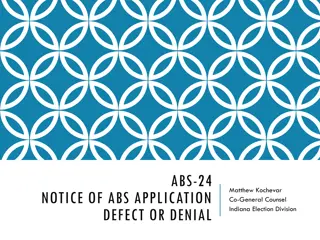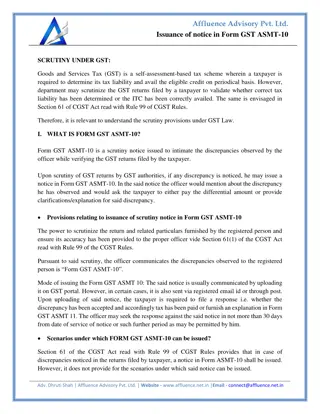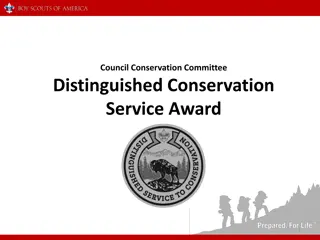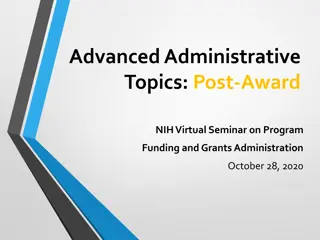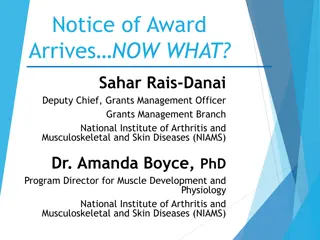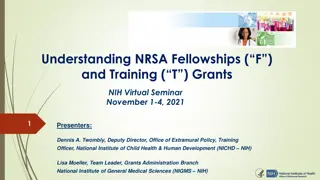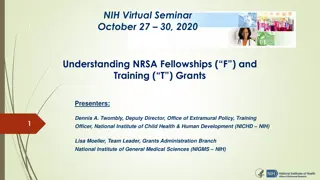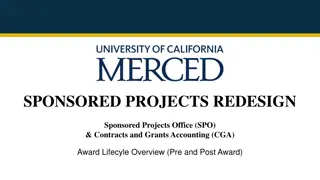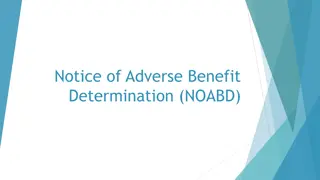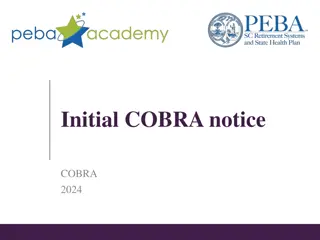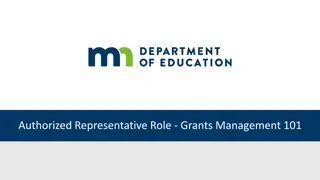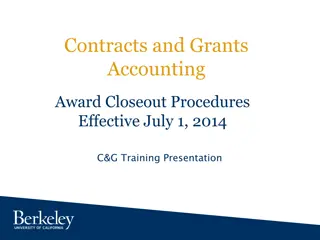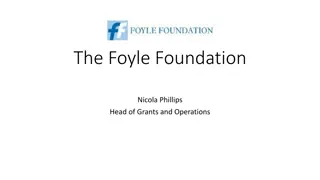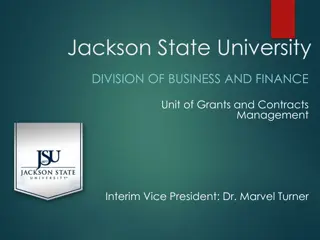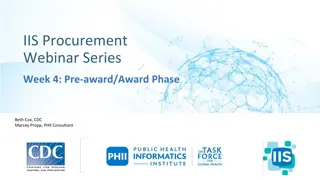Understanding the Notice of Award in Grants Management
Dive into the essentials of the Notice of Award (NoA) in grants management, covering its significance, contents, upcoming changes, and components including award data, fiscal information, grant payment details, and more. Gain insights into the key aspects of the NoA to navigate successfully through the grants process.
Download Presentation

Please find below an Image/Link to download the presentation.
The content on the website is provided AS IS for your information and personal use only. It may not be sold, licensed, or shared on other websites without obtaining consent from the author. Download presentation by click this link. If you encounter any issues during the download, it is possible that the publisher has removed the file from their server.
E N D
Presentation Transcript
Notice of Award Arrives NOW WHAT? Bryan Clark, MBA Chief, Grants Management Officer Grants Management Branch Eunice Kennedy Shriver National Institute of Child Health and Human Development (NICHD) Roger Sorensen, PhD, MPA Program Official Chief, Integrative Neuroscience Branch Division of Neuroscience and Behavior National Institute on Drug Abuse (NIDA)
Topics of Discussion Notice of Award Prior Approvals Change in PI Status Change in Recipient Organization Change in Scientific Scope Carryovers No-Cost Extensions Supplements
Topics of Discussion (cont) Reporting Requirements Inventions Federal Financial Report [FFR] FCOI Audit Research Performance Progress Report [RPPR] Close Out
What is in the Notice of Award Letter? Legally Binding Document Identifies grantee, PI Establishes funding level, support period Sets forth terms and conditions Includes NIH Contact Information for assigned Program Director & Grants Management Specialist Sent to the business official (e-mailed) Available in Commons Status
NoA - New Page One Upcoming Changes to the Notice of Award (NoA) Beginning October 1, 2020 Notice Number: NOT-OD-20-155 https://grants.nih.gov/grants/guide /notice-files/NOT-OD-20-155.html View Notice of Award webpage
Components of the Notice of Award NOA Section I: Award Data & Fiscal Information Summary of totals for current and future years Fiscal year of award NOA Section II: Grant Payment Information OIG Hotline Information
NOA SECTION II PAYMENT/HOTLINE INFO. For Domestic Non-Federal Institutions: Grant payments are available through the DHHS Payment Management System (PMS). PMS is administered by the Division of Payment Management, Program Support Center (PSC), DHHS, Office of the Deputy Assistant Secretary, Finance. Requests for downloadable forms and inquiries regarding payment should be directed to PMS: https://pms.psc.gov/
NOA SECTION II HOTLINE INFO. (continued) HHS Inspector General maintains a toll-free hotline for receiving information concerning fraud, waste, or abuse under grants and cooperative agreements. Reports are kept confidential and callers may decline to give their names if they choose to remain anonymous: Office of Inspector General Department of Health and Human Services 330 Independence Avenue, SW Washington, DC 20201 (1-800-447-8477 or 1-800-HHS-TIPS) https://oig.hhs.gov/fraud/report-fraud/index.asp
NOA Section III: Standard Terms & Conditions Grant program legislation and regulations Restrictions on the expenditure of funds in appropriation acts 45 CFR 74 or 92 as applicable NIH Grants Policy Statement Carryover automatic or prior approval Included/excluded from Streamlined Noncompeting Award Process (SNAP) FDP Institutions noted Program Income
NOA Section IV: Specific Terms and Conditions Examples: Revisions Cooperative Agreement Restrictive terms Staff Contact Information Spreadsheet Summary
Grantee Acceptance The grantee indicates acceptance of the terms and conditions of the award by drawing down funds from the Payment Management System
Prior Approval Certain post-award actions require the prior approval of the NIH Grants Management Officer https://grants.nih.gov/grants/policy/ nihgps/html5/section_8/8.1.2_prior_a pproval_requirements.htm
Prior Approval Requirements Change in Status of PI Change of Recipient Organization Change in Scope Carryover of Unobligated Balances No Cost Extensions Alterations and Renovations Capital Expenditures Change of Recipient Organization Status Deviation from Award Terms Addition of Foreign Component Subawards Based on Fixed Amounts Need of Additional NIH Funding without Extension of Budget/Project Period Need of Additional NIH Funding with Extension of Budget/Project Period Pre-Award Costs Rebudgeting of Funds from Trainee Costs Rebudgeting of Funds Between Construction and Non- Construction Work Retention of Research Grant Fund When a Career Development Award (K) is Issued See Section 8.1.2 of the NIH Grants Policy Statement
Requesting Prior Approval See ERA Help for the Prior Approval Module and the eRA Commons User Guide Requests in writing: Submitted in writing or via email include complete grant number, PI name and contact information, grantee name Submitted to the awarding IC s Grants Management Specialist no later than 30 days before the proposed change Signed by the PI and administrative official Only responses to prior approval requests signed by the GMO are valid
Prior Approval Status of PI Grantee organization must notify NIH: PI/key personnel has >25% change in effort PI will be absence for 90 days or more PI withdraws from project Change from an MPI to a single PD/PI model Change from a single PD/PI model to an MPI There is a change in the makeup of the PD/PIs on a multiple PD/PI award
Prior Approval Change in Recipient Organization In general, the award belongs to the recipient organization on record Original recipient must formerly relinquish the award (Relinquishing Statement - PHS 3734) and provide the Final Invention and Certification Statement and Federal Financial Report (FFR) The new recipient can now submit the transfer application electronically (PA-18-590)
Prior Approval Change in Recipient Organization Program Officer assesses: Progress to date Adequacy of new resources and environment Availability of expertise (key personnel) Potential problems (e.g., equipment) Contact NIH Program and Grants Management Staff early!
Prior Approval - Scope Change in Scientific Scope of Project Significant change in aims, methodology, approach, or other aspects of project objectives as reviewed and approved Examples: Change in specific aims Change in use of animals or human subjects Shift of research emphasis Application of new technology Significant change in key personnel/expertise Final approval of a change in scope requires concurrence of the NIH Program Officer and Grants Management Specialist.
Prior Approval Carryover of Unobligated Balance Requires a timely, written request submitted through the AOR that includes a detailed budget and budget justification Justification requires a rationale for why funds were not spent in the year in which they were awarded and how they will be spent in the next year Justification must be tied to the scientific aims and goals of the project Be sure to have a timely FFR submission See Section 8.1.1 of the NIH Grants Policy Statement
Prior Approval Carryover of Unobligated Balance Submit when there is true financial need for the funds Requested carryover should be fully expended in the budget period of the request Example: A recipient submits a carryover request for $250K from the Year 10 unobligated balance to Year 11. If the carryover request is approved, NIH s expectation is the project will fully expend the Year 11 award amount in addition to the $250K in carryover by the end of the budget period.
Prior Approval No Cost Extensions Grantee may extend at the end of the project period up to 12 months without prior approval Submit electronically via eRA Commons Recipient agrees to update all required certifications and assurances Additional no cost extensions require Program AND Grants Management approval Include in the request: Remaining funds available Progress completed since submission of the last RPPR. An explanation of why you could not finish your project on time. A scientific rational for continuing the project.
Competing Revisions Peer Reviewed revision applications that support an expansion of existing projects and/or programs. Expands the scientific scope of parent grant Change in specific aims Change from the approved use of animals or human subjects Shift of research emphasis from one disease area to another Transfer of substantive programmatic work to a third party PA-20-163: Competing Revisions to Existing NIH Grants and Cooperative Agreements (Clinical Trial Optional)
Administrative Supplements Program Reviewed request for additional funds: To enhance scope or add value to the parent grant To cover unanticipated expenses, such as: Catastrophes or natural disasters Critical equipment breakdowns Loss of equipment originally available from other sources (facility closures, earthquake damage) Loss of source for critical reagents Salary increases Phase out of grant PA-18-591: Administrative Supplements to Existing NIH Grants and Cooperative Agreements (Parent Admin Supp Clinical Trial Optional)
Reporting Requirements Annual Reporting Closeout Reporting *Inventions and Patents *Federal Financial Report (FFR) Federal Cash Transaction Report (FCTR) *Financial Conflict of Interest (FCOI) *Audit Reporting Research Performance Progress Report (RPPR) Final or Interim RPPR Final FFR Final Invention Statement and Certification * If applicable
Inventions and Patents Section 8.2.4 NIH Grants Policy Statement The Bayh-Dole Act of 1980 (Public Law 96-517; 35 U.S.C. 200-212; EO 12591; 37 CFR 401 et al; updated April 14, 2018) provides NIH funding recipients incentives to promote the utilization of inventions conceived or reduced to practice (Subject Invention) in the performance of federally supported research and development. Unless waived by NIH or the funding agreement is for education purposes, e.g. fellowships, training grants or certain types of career development awards, the Bayh-Dole Act applies to all NIH research and development funding granted to for- profit organizations regardless of size and all non- profit entities (see 45 CFR 75 and 37 CFR 401.1 (b)) All Bayh-Dole compliance actions are required to be submitted through iEdison.gov (see 37 CFR 401.16).
Federal Financial Report [FFR] Due 90 days after the end of EACH budget period Reflect funds that were expended in a budget period MUST BE SUBMITTED BEFORE CARRYOVER REQUESTS ARE CONSIDERED Grant will not be processed if FSR has not submitted AND accepted into the system
Federal Cash Transaction Reporting (via PMS) Domestic recipients only Cash Transaction Reporting (CTR) data due within 30 days after the end of each fiscal year quarter and within 90 days after the end of your project. Quarter Begins October 1 January 1 April 1 July 1 Quarter Ends December 31 March 31 June 30 September 30 CTR Due January 30 April 30 July 30 October 30 See Section 8.4.1.5.1 of the NIH Grants Policy Statement and Payment Management System, for more information
Financial Conflict Of Interest (FCOI) Section 4.1.10 NIH Grants Policy Statement NIH requires recipients and investigators (except I SBIR/STTR applicants and recipients) to comply with the requirements of 42 CFR 50, Subpart F, Responsibility of Applicants for Promoting Objectivity in Research for which PHS Funding is Sought. The requirements under the 2011 revised regulation (Published on August 25, 2011 in the Federal Register) promote objectivity in research by establishing standards that provide a reasonable expectation that the design, conduct, or reporting of research funded under PHS grants or cooperative agreements will be free from bias by any conflicting financial interest of an Investigator, regardless of title or position. The signature of the AOR certifies that: 1. There is in effect at the Institution an up-to-date, written and enforced administrative process to identify and manage FCOIs 2. The Institution shall promote and enforce Investigator compliance with the regulation s requirements including those pertaining to disclosure of financial interests 3. The Institution shall identify and manage FCOIs and provide initial and ongoing FCOI reports to the NIH 4. When requested, the Institution will promptly make information available to the NIH/HHS relating to any Investigator disclosure of financial interests 5. The Institution shall fully comply with the requirements of the regulation See also: http://grants.nih.gov/grants/policy/coi/index.htm FCOICompliance@mail.nih.gov
Audit Reporting $750K or more in Federal awards For-Profit Organizations State and local governments and non-profit organizations 45 CFR Part 75.501 Applies to foreign organizations Two options: o Government Auditing Standard (Yellow Book) o Audit that meets the requirements of 45 CFR Part 75, Subpart F Submit to HHS Audit Resolution Division 45 CFR Part 75, Subpart F Single Audit reporting package submitted on-line Federal Audit Clearinghouse See Section 8.4.3 of the NIH Grants Policy Statement .
RPPR - eRA Commons Commons-registered institutions and PIs: Have access to due date information through the Commons Status system (electronic submission for SNAP) Have access to pre-populated face pages via Status (available one month prior to submission window) eRA Commons Website: https://commons.era.nih.gov/commons/ind ex.jsp
Research Performance Progress Report (RPPR) 1. Annual RPPR Use to describe a grant s scientific progress, identify significant changes, report on personnel, and describe plans for the subsequent budget period or year. 2. Final RPPR Use as part of the grant closeout process to submit project outcomes in addition to the information submitted on the annual RPPR, except budget and plans for the upcoming year. 3. Interim RPPR Use when submitting a renewal (Type 2) application. If the Type 2 is not funded, the Interim RPPR will serve as the Final RPPR for the project. If the Type 2 is funded, the Interim RPPR will serve as the annual RPPR for the final year of the previous competitive segment. The data elements collected on the Interim RPPR are the same as for the Final RPPR, including project outcomes. https://grants.nih.gov/grants/rppr/index.htm
Research Performance Progress Report (RPPR) Streamlined Non-Competing Award Process (SNAP) Non-SNAP In general includes Ts, Us, Ps, non-Fast Track Phase I SBIR & STTR awards, clinical trials and R35 In general includes K and R (except R35) activity codes RPPR is due approx. 60 days before the next budget period start date RPPR is due approx. 45 days before the next budget period start date Detailed budget request Automatic carryover Annual FFR* Carryover requires prior approval* See Section 8.4.1.2 of the NIH Grants Policy Statement
SNAP Administrative & Fiscal Requirements Detailed budgets not required Federal Financial Reports due at end of competitive segment Automatic carryover THREE RESPONSES:
SNAP Administrative & Fiscal Requirements 1. Changes in Other Support New/terminated grant awards (not pending awards) Check for scientific overlap 2. Changes in Level of Effort (>25%) New/lost personnel Briefly describe reason for change(s) 3. Anticipated Unobligated Balance greater than 25% of previous budget period Provide brief description on future use of these funds If replacing personnel, provide duties/expertise
RPPR Public Access NIH Public Access Policy NIH-funded investigators must submit or have submitted for them to the National Library of Medicine's PubMed Central an electronic version of their final, peer- reviewed manuscripts upon acceptance for publication, to be made publicly available no later than 12 months after the official date of publication List all publications citing your grant previous year Don t wait until progress report is due http://grants.nih.gov/grants/guide/notice-files/NOT- OD-09-071.html http://publicaccess.nih.gov/
Non-SNAP RPPR Administrative and Fiscal Contents Detailed budget, justification, and updated other support, IRB and IACUC Address unobligated balance > 25% Total Costs as commitment base Annual Federal Financial Report
What Not to Submit with the RPPR Prior Approval Requests Carryover Requests Requests for Supplemental Funding Requests for Additional Time to the Final Budget and Project Period * These administrative actions that need to be addressed separately.
NIH Closeout Requirements NIH recipients must submit three final reports within 120 days of the project period end date: Final Federal Financial Report Final Invention Statement and Certification Final RPPR (F-RPPR) or I-RPPR 1. 2. 3. After 180 days, the award enters unilateral closeout!
Final Federal Financial Report At time of closeout, ensure there are no discrepancies in reporting between: o Final FFR expenditure data (in eRA Commons) and o FFR cash transaction data (in PMS) Failure to submit an acceptable final FFR in a timely manner may result in disallowed costs or federal debt o If a recipient fails to submit a final FFR expenditure data report - NIH must use the last recorded quarterly cash disbursement level o If the final FFR expenditure data does not match the amount reported on last FFR cash disbursement report to PMS - NIH must use the lower amount - results in federal debt See Section 8.6.1 NIH Grants Policy Statement
Final Invention Statement and Certification Section 8.6.3 NIH Grants Policy Statement The recipient must submit a Final Invention Statement and Certification (HHS 568), whether or not the funded project results in any subject inventions, and whether or not inventions were previously reported. The HHS 568 must list all inventions that were conceived or first actually reduced to practice during the course of work under the project, and it must be signed by an AOR. If there were no inventions, the form must indicate None. For questions, the recipient should contact the NIH awarding IC for specific instructions. When invention reporting is required, the HHS 568 does not relieve the responsible party of the obligation to assure that all inventions are promptly and fully reported directly to the NIH, as required by the terms of award.
Differences Between the Annual RPPR vs. Final RPPR Final RPPR Annual RPPR Cover Page Cover Page A. A. Accomplishments Accomplishments B. B. Products C. Products C. Participants and Other Collaborators D. Participants D. Impact E. Impact SBIR/STTR only E. Changes F. Changes F. Special Reporting Requirements G. Special Reporting Requirements G. Budget Budget H. H. Project Outcomes I.
Requirements for Project Outcomes Outcomes section of the RPPR specifically designed to be made publicly available (analogous to the abstract in the competing application) Reporting in the Outcomes section is limited to 8,000 characters Provide a concise summary of the findings of the award written in lay language for the general public In an effort to increase transparency NIH will make the Outcomes data available in RePORTER See Extramural Nexus Open Mike posted 02/01/17
RESOURCE WEB LINKS Office of Extramural Research Grants Home Page: http://grants.nih.gov/grants/oer.htm NIH Grants Policy Statement (12/2019): https://grants.nih.gov/policy/nihgps/index.htm NIH Guide: http://grants.nih.gov/grants/guide/index.html RPPR: https://grants.nih.gov/grants/rppr/index.htm
Questions? Bryan Bryan.Clark@nih.gov Roger Roger.Sorensen@nih.gov




